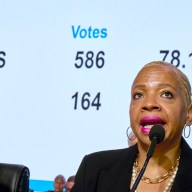The NHL vowed to find an owner that will keep the Phoenix Coyotes where they are Monday night after an Arizona bankruptcy judge rejected Jim Balsillie’s bold bid to buy the insolvent team and move it to Hamilton.
Judge Redfield T. Baum made his highly anticipated decision public earlier in the evening, saying in a 21-page ruling that there wasn’t enough time to deal with all the unresolved issues raised by the unprecedented case.
That prompted Balsillie to offer the NHL an olive branch and propose to work with it in attempt to find “an appropriate” relocation fee to bring the club north through mediation.
But buoyed by the judgment, the league says it plans to help a future owner make the Coyotes viable in Glendale, and its claims that four parties have expressed an interest in operating the team there will now be put to the test.
“We are confident that we will be able to find such a buyer for the Coyotes,” deputy commissioner Bill Daly said in a statement, “and that the claims of legitimate creditors will be addressed.”
The ruling brings to a close more than a month of intense of often dramatic legal manoeuvring, set off when Balsillie sought to buy the Coyotes out of Chapter 11 protection with a US$212.5 million offer that was conditional on being able to move the team to Hamilton. He had set a June 29 closing date for the sale in an attempt to speed through the process and have the club in place for the 2009-10 season.
But Baum rejected that timeline and several aspects of the arguments made by his lawyers, writing their claims that the league’s refusal to allow the team to move does not violate antitrust law and permit “the sale free and clear of the relocation rights of the NHL.”
He noted how busy this time of year is for the league, pointing out that commissioner Gary Bettman left last Tuesday’s court hearing in Phoenix to attend Game 6 of the Stanley Cup final in Pittsburgh, and that “relocation applications create significant issues that mandate careful consideration by all affected parties. …”
“This court is unconvinced that it should order that the NHL must decide the relocation application to meet the June 29th deadline.”
Toss in the need to figure out how much the relocation fee for moving the Coyotes to Hamilton and the looming auction set for June 22, and Baum felt that: “Simply put, the court does not think there is sufficient time (14 days) for all of these issues to be fairly presented to the court given that deadline.”
Typically, the NHL and Balsillie didn’t see eye-to-eye on the ruling.
The NHL, which had argued that his bid was designed to skirt rules on the transfer of ownership and relocation and should be rejected for that reason, said it was “pleased” the decision “recognized the validity of league rules and our ability to apply them in a reasonable fashion.”
The potential buyers it floated in court documents – including Toronto Argonauts owners Howard Sokolowski and David Cynamon, and Chicago White Sox and Bulls owner Jerry Reinsdorf – now have the opportunity to take control of a franchise that has lost over $300 million since the Winnipeg Jets moved to the desert in 1996.
Balsillie, shot down in his third attempt to buy an NHL team, took heart that Baum noted the approval bestowed on him by the league’s board of governors for his attempted purchase of the Pittsburgh Penguins in 2006, and the judge’s statement that barring the relocation issue, “the NHL can not object or withhold its consent to (Balsillie) becoming the controlling owner of the Phoenix Coyotes.”
That led Balsillie to ask the NHL to work through the relocation application he recently filed.
“Jim Balsillie’s bid to bring a seventh NHL team to Canada continues,” spokesman Bill Walker said in a statement. “We still think there is enough time for the NHL to approve Mr. Balsillie’s application and move the team to Hamilton by September. The court invited mediation on these issues and Mr. Balsillie is willing to participate in such mediation if the NHL is also willing to do so.”
Given the bitterness with which this saga played out, there’s little chance of that.
Hamilton, which had lined up behind Balsillie and was ready to welcome him with open arms, still clung to hope that it won’t end up a jilted bridesmaid once more, that its hopes of becoming home to a seventh Canadian NHL team falling short just like several other previous attempts.
“There’s still a window of opportunity here,” Hamilton mayor Fred Eisenberger told the Hamilton Spectator. “The issue is still very much alive. It doesn’t mean relocation can’t happen. I’ve always expected it to be a bit of a roller coaster ride and it certainly is.”
The ride began May 5, when Coyotes owner Jerry Moyes surprised the NHL and filed for Chapter 11 protection.
Coyotes owner Jerry Moyes aligned with Balsillie against the NHL, hoping to recoup about $100 million of the $300 million he put into the club. He must now fight off league attempts to discredit him as a legitimate creditor, something it did in court filings for the case.
The city of Glendale, which spent $183 million to build an arena for the Coyotes and argued that the franchise could not use bankruptcy to escape its lease, was relieved by the ruling, although it may be called upon to make concessions of up to $20 million annually to help keep the team around long term.
“Clearly the court recognized the significance of these issues and the unique interests of the City of Glendale and its taxpayers,” the city said in a statement. “The court based its decision on the law and facts and not on countless rumours and innuendo regarding this matter.”
All the sides were on pins and needles waiting for a ruling that was expected last week after a nearly seven-hour hearing June 9 ended with Baum telling the parties he wanted to sleep on the matter before deciding how they should proceed.
Baum offered hints of where his thinking was at during the hearing when he said he believed the NHL was entitled to a relocation fee if the Coyotes are moved to Hamilton, and put the league on notice that it may be ordered to work quickly to determine exactly how much that would be.
There were suggestions the sides go to mediation for the matter, but Thursday the court issued a notice saying Baum “will not be setting a separate hearing on the relocation and fee issue. It will be dealt with in the court’s ruling from the (June 9) hearing.”
That raised speculation a decision was imminent.
The relocation fee became critical since it would eat away from the money available to creditors, making Balsillie’s bid virtually worthless to them should he decide not to pay it.
One of the lawyers for the co-CEO of BlackBerry maker Research in Motion let slip during the hearing that they believe the NHL would charge $100 million for the move – a figure redacted from court documents and not confirmed by the league.
There may also have been some sort of indemnity fees demanded by or due to the Toronto Maple Leafs and Buffalo Sabres as compensation for the incursion into their territory, and it’s unclear whether Balsillie would have been willing to ante up.
Richard Rodier, his representative, noted outside the courthouse last Tuesday that the deal allows Balsillie to walk away if there’s a relocation fee, but the billionaire said in a statement Wednesday that he was one step closer to his goal of a seventh NHL team in Canada.
The NHL had steadfastly stuck to its view that there can be no relocation fee discussion until both an owner and the move have been approved by its governors.
















